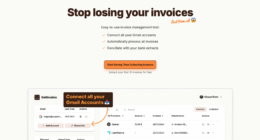Data management software helps small businesses organize and analyze their critical information efficiently. Modern solutions like Dell Boomi, Microsoft Azure, and Talend offer cloud-based platforms with robust security, easy-to-use interfaces, and automation features that reduce manual tasks by up to 40%. These tools typically include data integration capabilities, quality control measures, and scalable storage options – all while remaining cost-effective for growing companies. Exploring the right software solution can transform how a business handles its valuable data assets.
Quick Overview
- Cloud-based platforms like Dell Boomi and Microsoft Azure offer scalable solutions that grow with your business needs.
- User-friendly software options such as Insightly provide affordable data management with minimal training requirements.
- Open-source tools like Talend deliver enterprise-level features without the hefty price tag of proprietary solutions.
- Data management systems should include robust security measures, including encryption and controlled access for sensitive information.
- Automation capabilities reduce manual tasks by up to 40%, allowing staff to focus on strategic business activities.
Understanding the Role of Data Management in Small Business Growth

While many small business owners focus primarily on day-to-day operations, effective data management has become an essential foundation for sustainable growth in the digital age.
In today’s market, where businesses generate massive amounts of information daily, implementing robust data management processes enables companies to harness valuable insights from their data analytics efforts.
By consolidating data from multiple sources into a centralized data system, small businesses can greatly improve their operational efficiency.
This integration allows for automated data processing, reducing manual tasks and ensuring better data quality.
Moreover, proper data management helps businesses maintain compliance with regulations while protecting sensitive information.
With the right approach to organizing and analyzing information, small businesses can transform raw data into actionable insights, leading to smarter decision-making and sustained competitive advantage in an increasingly data-driven marketplace.
Modern solutions like no-code platforms provide accessible options for businesses to build custom data management applications without requiring extensive technical expertise.
Key Features to Look for in Small Business Data Management Tools
Selecting the right data management tools requires careful consideration of essential features that align with small business needs and objectives. When evaluating potential solutions, businesses should focus on several critical capabilities that guarantee long-term success and efficiency.
Scalability features stand at the forefront, enabling systems to grow alongside expanding data needs. Strong integration capabilities facilitate seamless data flow between existing software platforms, while robust data security measures protect sensitive information through encryption and access controls.
User-friendly interfaces reduce employee training time and boost adoption rates across the organization. Additionally, automated data management features and built-in data governance tools help maintain high data quality standards.
These elements work together to guarantee compliance with regulations while supporting efficient decision-making processes through consistent, accurate data management.
Top Data Management Solutions for Budget-Conscious Small Businesses

Small businesses can achieve robust data management without breaking the bank through several cost-effective solutions available in today’s market.
Cloud-based data management platforms like Dell Boomi and Microsoft Azure Data Factory offer scalable integration capabilities at flexible price points, making them ideal for growing companies.
For budget-conscious small businesses, open-source tools like Talend provide powerful data integration features without substantial upfront costs.
Astera’s no-code platform simplifies data management processes, allowing teams to automate workflows efficiently.
Companies seeking to maintain data accuracy and consistency can leverage affordable data quality tools like Profisee.
User-friendly data management software solutions, such as Insightly, come with affordable pricing plans that help small businesses streamline their operations while ensuring reliable customer relationship management.
These tools deliver enterprise-level functionality without the enterprise-level price tag.
Similar to cloud accounting platforms like Xero and Wave, these data management solutions help businesses automate administrative tasks and improve operational efficiency.
Implementing Data Management Systems: A Step-by-Step Guide
Successfully implementing a data management system requires careful planning and a methodical approach that considers both technical requirements and organizational dynamics.
Organizations must focus on scalability needs and integration capabilities while guaranteeing robust data governance practices are in place.
A systematic implementation process includes:
- Conducting a thorough assessment of current data management practices and establishing clear data quality standards
- Selecting appropriate data management software that aligns with budget constraints and organizational requirements
- Launching a pilot program to test system functionality and gather user feedback before full deployment
- Training staff effectively on user-friendly interfaces and workflow automation features
This structured approach helps maintain data integrity throughout the implementation process.
Maximizing ROI Through Effective Data Management Practices

Once a data management system is in place, businesses must focus on maximizing their return on investment through smart, strategic practices. Implementing effective data management practices can boost operational efficiency by 30%, while a solid data strategy reduces data handling costs by 20%.
Small businesses can achieve significant ROI through several key approaches. Cloud-based data management solutions offer enhanced scalability while cutting ownership costs by 25% compared to traditional systems.
Cloud solutions empower small businesses with scalable data management while significantly reducing costs compared to conventional systems.
Data quality initiatives and proper governance tools improve decision-making accuracy, potentially increasing revenue by 15%. Additionally, automation through data management software liberates up to 40% of staff time from manual tasks, allowing teams to focus on strategic growth initiatives.
These improvements combine to create a thorough approach that drives business performance and competitive advantage through optimized data utilization. Real-time data sharing enables seamless team collaboration and transparency, further enhancing operational efficiency across the organization.
Future-Proofing Your Business With Scalable Data Management Strategies
Modern businesses require scalable data management strategies to handle the staggering 3.5 quintillion bytes of data generated daily across industries.
Future-proofing business operations demands robust data management software that can grow alongside organizational needs.
PostgreSQL database solutions offer excellent scalability and security features for organizations seeking open-source alternatives.
- Cloud data management platforms enable seamless scalability while providing real-time analytics capabilities for informed decision-making.
- Master data management tools guarantee data consistency across departments, improving operational efficiency and strategic planning.
- ETL tools and data integration solutions streamline the process of combining information from multiple sources, enhancing data accessibility.
- Thorough data governance frameworks protect sensitive information while maintaining compliance with evolving regulations.
Frequently Asked Questions
Which Software Is Best for Data Management?
For ideal data management, Microsoft Azure Data Factory emerges as the most thorough solution.
It offers robust scalability, hybrid integration capabilities, and user-friendly interfaces that accommodate growing business needs.
While Astera and Dell Boomi excel in specific areas, Azure’s combination of powerful ETL processes, cloud flexibility, and extensive integration options makes it the superior choice.
Additionally, its built-in security features and seamless compatibility with other Microsoft tools enhance its overall value.
What Are the 4 Types of Data Management System?
The four main types of data management systems are:
- Hierarchical Systems – Data is organized in a tree-like structure, with parent-child relationships between records.
- Network Systems – Data elements are connected through multiple relationships, allowing more complex data structures.
- Relational Systems – Data is organized in tables with rows and columns, using SQL for querying and manipulation.
- Object-Oriented Systems – Data and operations are combined into objects, supporting complex data types and inheritance features.
Each system serves different organizational needs and data handling requirements.
What Are the 5 C’s of Data Management?
Studies show that organizations implementing the 5 C’s of data management experience up to 35% improved decision-making accuracy.
The 5 C’s include Collection (gathering data from various sources), Cleaning (correcting errors and inconsistencies), Consolidation (unifying data into a central system), Compliance (following data protection regulations), and Communication (sharing insights across the organization).
These principles form a thorough framework that helps organizations maintain effective data practices and drive better business outcomes.
Is Excel Data Management Software?
Excel functions as a basic data management software solution, offering fundamental capabilities for organizing, analyzing, and visualizing data.
While it provides essential features like sorting, filtering, and pivot tables, it’s considered an entry-level tool rather than an all-encompassing data management system.
For small businesses with limited data needs, Excel can be sufficient, but as data complexity grows, organizations typically need more robust solutions that offer better security, collaboration, and data integrity features.
Conclusion
Data management solutions are no longer just digital filing cabinets – they’re the compass guiding small businesses through the modern marketplace. Like the trusty pocket watch of yesteryear, reliable data management keeps operations running smoothly and on time. By selecting the right software, implementing best practices, and planning for scalability, small businesses can transform raw data into actionable insights that drive growth and secure their competitive edge in an increasingly data-driven world.








